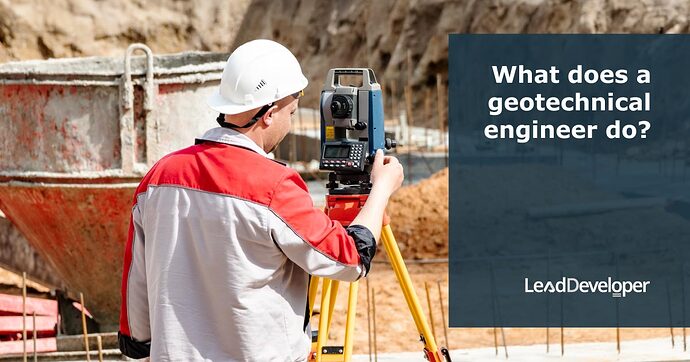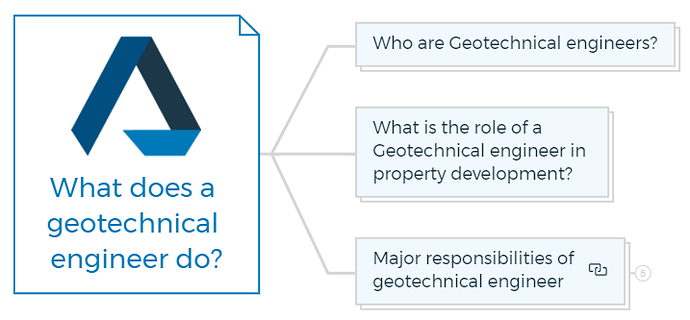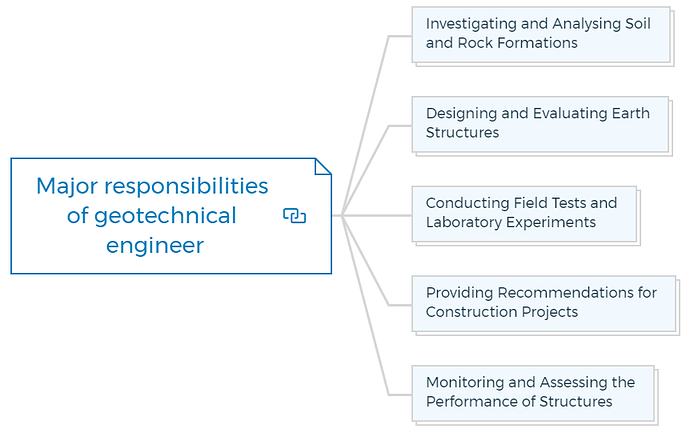Who are Geotechnical engineers?
Geotechnical engineering is a fascinating field that deals with analysing, designing, and constructing earth structures. Geotechnical engineers are responsible for evaluating soil and rock formations to determine their properties and behaviour.
They use this information to design foundations, tunnels, dams, retaining walls, and other infrastructure projects.
The work of a geotechnical engineer is essential to the construction aka property development industry. Without their expertise, structures would not be able to withstand the stresses of their intended use, leading to potential safety hazards and costly repairs.
Learn More
What is the role of a Geotechnical engineer in property development?
Geotechnical engineers analyse and report soil composition. The soil report depends on the testing and findings done by a technician.
In subdivisions, the structural and civil engineers will use the geotechnical report to design foundations, subgrades, and pavements. The landscape architect also considers soil types in the landscape designs.
Geotechnical reports may be part of the due diligence investigation or necessary before the building permit application design.
You are missing out if you haven’t yet subscribed to our YouTube channel.
Major responsibilities of geotechnical engineer
Here are some of the primary responsibilities of a Geotechnical engineer in property development.
Investigating and Analysing Soil and Rock Formations
One of the primary tasks of a geotechnical engineer is to investigate and analyse soil and rock formations.
They use various techniques to determine the strength, stability, and other physical characteristics of these materials. This information is critical in designing structures that can withstand the forces of nature and human use.
Geotechnical engineers conduct soil borings, perform laboratory tests on soil and rock samples, and analyse data to determine the properties of the materials.
They use this information to design structures that can withstand the stresses of their intended use.
Designing and Evaluating Earth Structures
Geotechnical engineers use the data gathered from investigations to design and evaluate various earth structures. They ensure that the structures meet safety standards and can withstand the stresses of their intended use.
These structures can include foundations, tunnels, dams, retaining walls, and other infrastructure projects.
Geotechnical engineers use computer software to create models of the proposed structures and analyse how they will behave under different conditions. They evaluate different design options to determine the most efficient and effective way to construct the structure.
Property Development “How To’s” & Frequently Asked Questions
Includes 5 x detailed eBooks [142 pages]
✓ How To Become A Property Developer? In 10 Easy Steps (51 Pages)
✓ How To Overcome Fear In Property Development? (15 Pages)
✓ How To Become A Real Estate Developer? Without Experience (37 Pages)
✓ Property Developer FAQs – Who, What, When, How? (20 Pages)
✓ How To Become A Real Estate Millionaire In 10 Steps? (19 Pages)
Conducting Field Tests and Laboratory Experiments
Geotechnical engineers conduct field tests and laboratory experiments to assess the properties of soil and rock samples. Field tests can include drilling and sampling of soil, measuring groundwater levels, and assessing the stability of slopes.
Laboratory tests involve analysing soil and rock samples to determine their properties.
These tests provide critical information on the behaviour of soil and rock formations under various conditions, which is essential in designing structures that can withstand the stresses of their intended use.
Providing Recommendations for Construction Projects
Geotechnical engineers provide recommendations for foundation design, slope stability, and other aspects of construction projects based on investigations, analyses, and tests.
They collaborate with other professionals, including architects, contractors, and environmental engineers, to ensure that construction projects are carried out safely and efficiently.
Monitoring and Assessing the Performance of Structures
Geotechnical engineers monitor and assess the performance of constructed earth structures over time. They identify any potential issues and recommend corrective action if necessary.
Monitoring may involve measuring the settlement or movement of structures or assessing the impact of environmental changes.
The work of a geotechnical engineer is essential to the safety and stability of construction projects. Without their expertise, structures would not be able to withstand the stresses of their intended use, leading to potential safety hazards and costly repairs.
Geotechnical engineers play a critical role in ensuring that construction projects are safe, stable, and durable by analysing the behaviour of soil and rock formations and designing earth structures that can withstand the forces of nature and human use.






